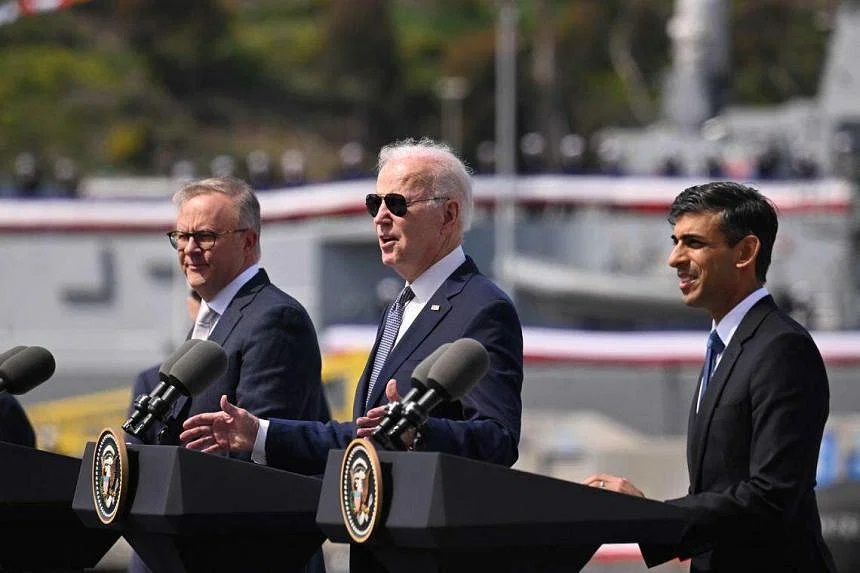Biden’s message to China as AUKUS submarines details unveiled
US President Joe Biden in a pointed five-word message to China has stressed the AUKUS is not about Australia acquiring nuclear weapons, nor a threat to Beijing.
Australia will spend up to $368 billion by 2055 to build a new fleet of eight nuclear-propelled submarines in Adelaide to enter service in the 2040s under the costliest defence project in the nation’s history.
Biden, appearing sensitive to tensions with China and its criticism of the deal, stressed that the submarines are “nuclear powered, not nuclear armed”.

‘Boats will not have any nuclear weapons’: Biden
“These boats will not have any nuclear weapons of any kind of them,” he said at an outdoor ceremony at Naval Base Point Loma in San Diego, where he was flanked by Prime Minister Anthony Albanese and UK Prime Minister Rishi Sunak
Under the deal, Australia will buy US-manufactured, nuclear-powered attack submarines to modernise its fleet amid concerns about China’s growing assertiveness in the Indo Pacific region.
Albanese said the agreement “represents the biggest single investment in Australia’s defence capability in all of our history.” It’s also the first time in 65 years that the U.S. has shared its nuclear propulsion technology, “and we thank you for it,” he said.
China has criticised the AUKUS deal, portraying it as a US-led bid to constrain the rising Asian superpower.
On Monday, China’s leader Xi Jinping vowed to bolster national security and build the military into a “great wall of steel,” in the first speech of his precedent-breaking third term as president.
“(We must) build the People’s Liberation Army into a great wall of steel that effectively safeguards national sovereignty, security, and development interests,” Xi told the National People’s Congress (NPC).

Biden: ‘Australian personnel will embed with US and UK crew’
Biden said Australian navy sailors will this year be embedded with US and UK nuclear submarine crews to start training.
“Beginning this year, Australian personnel will embed with US and UK crews on boats and at bases in our schools and our shipyards. We will be increasing our port visits to Australia.”
He also confirmed US Virginia class submarines will begin visiting Australian ports.
“We will be increasing our port visits to Australia. In fact, as we speak, the nuclear-powered sub USS Asheville is making a pit stop in Perth.
“We will have subs in Australia to help develop the workforce Australia is going to need to build and maintain its fleet.

Albanese said the AUKUS deal marked a new chapter in Australia’s alliance with the US and Britain.
“Today a new chapter in the relationship between our nation, the United States and the United Kingdom begins.
“A friendship built on our shared values, our commitment to democracy and our common vision for a peaceful and our common vision for a peaceful and a prosperous future.

“The AUKUS agreement we confirm here in San Diego represents the biggest single investment in Australia’s defence capability in the all of our history. Strengthening Australia’s national security and stability in our region.”
Albanese confirmed from early in the next decade, Australia will take delivery of three US Virginia-class nuclear-powered submarines.
It is only the second time in history that the US has shared its nuclear submarines technology.
Albanese confirmed Australia will build a nuclear-powered but conventionally armed submarine with the UK, to be called SSN-AUKUS.
He said the massive defence project would bring billions of dollars of investment and thousands of jobs to Australia.

“This will be an Australian sovereign capability – built by Australians, commanded by the Royal Australian Navy and sustained by Australians in Australian shipyards – with construction to begin within this decade.,” Albanese said.
“Opportunities that will shape, and strengthen, and grow Australia’s economy for decades and create around 20,000 direct jobs for Australians from many trades and specialisations.
“Engineers, scientists, technicians, submariners, administrators and trades people. Good jobs, with good wages, working to ensure the stability and prosperity of our nations, our region, and our world.
“Our future security will be built and maintained not just by the courage and professionalism of our defence forces, but by the hard work and know-how of our scientists and engineers, our technicians and programmers, electricians and welders.”
“For Australia, this whole-of-nation effort also presents a whole-of-nation opportunity. We will work with the state governments of South Australia and Western Australia to develop training programs that equip Australians with the skills they need to fill these jobs.”
British engineers ‘to share knowledge’
UK Prime Minister Rishi Sunak said British engineers will share nuclear submarine technology with their Australian counterparts.
“We will share our knowledge and experience with Australian engineers so they can build their own fleet.
“Our partnership is significant because not just are we building these submarines together, they will also be truly intraoperable.
Sunak said AUKUS was a “powerful partnership” that aimed at promoting freedom of the seas.
“For the first time ever, it will mean three fleets of submarines working together across both the Atlantic and Pacific, keeping our oceans free, open and prosperous for decades to come.”
AUKUS details revealed
The federal government said today the full cost of the program, including construction and maintenance, to range from $268 billion to $368 billion over the life of the program to 2055.
The three leaders are in San Diego – the base of the US Pacific Fleet – to lock in the agreement that comes amid growing concerns about China’s influence in the Indo-Pacific region.
Under the AUKUS plan, Australia will begin hosting deployments by US submarines from this year and by British vessels from 2026.
The long-term goal is for Australia to build a new fleet of nuclear-powered submarines known as SSN-AUKUS, in a joint design with the UK made in Adelaide. They are planned to enter service in the 2040s.
To bridge a capability gap, Australia will purchase three Virginia-class submarines.

In a joint statement, Prime Minister Anthony Albanese and Defence Minister Richard Marles said Australian business would receive billions of dollars in investment from the AUKUS deal.
“We expect the phased approach will result in $6 billion invested in Australia’s industrial capability and workforce over the next four years, creating around 20,000 direct jobs over the next 30 years.
“This whole of nation effort also presents a whole of nation opportunity; for new jobs, new industries, and new expertise in science, technology, and cyber.
“Businesses right across the country in every state and territory will have the opportunity to contribute to and benefit from these opportunities over decades.
“Over the next four years, this will see $2 billion in expected investment into South Australia, and a further $1 billion in Western Australia.”
The AUKUS partnership, announced in 2021, paved the way for Australia’s access to nuclear-powered submarines, which are stealthier and more capable than conventionally powered boats, as a counterweight to China’s military buildup.
China response
Overnight, China’s leader Xi Jinping vowed to bolster national security and build the nation’s military into a “great wall of steel”.
UK Prime Minister Sunak, also warned overnight about China’s aggression toward Taiwan and how that could lead to a world potentially defined by danger.

The US would also step up its port visits in Australia to provide the country with more familiarity with the nuclear-powered technology before it has such subs of its own.
Biden will also hold bilateral meetings with Albanese and Sunak, an opportunity to coordinate strategy on a range of global challenges, including Russia’s war in Ukraine and the global economy.
The secretly brokered AUKUS deal included the Australian government’s cancellation of a $90 billion contract for a French-built fleet of conventional submarines, which sparked a diplomatic row within the Western alliance that took months to mend.
Meanwhile, China has argued that the AUKUS deal is in violation of the Nuclear Non-Proliferation Treaty, arguing that transfer of nuclear weapons materials from a nuclear-weapon state to a non-nuclear-weapon state is “blatant” violation of the spirit of the pact.


Australian officials have pushed back against the criticism, arguing that it is working to acquire nuclear-powered and not nuclear-armed submarines.
“The question is really how does China choose to respond because Australia is not backing away from what it — what it sees to be doing in its own interests here,” said Charles Edel, a senior adviser and Australia chair at the Centre for Strategic and International Studies.
“I think that probably from Beijing’s perspective they’ve already counted out Australia as a wooable mid country. It seemed to have fully gone into the US camp.”
– Reported with Associated Press, CNN









